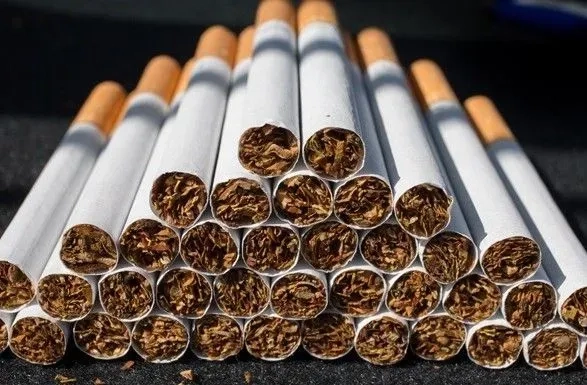Reducing the illicit circulation of tobacco products in Ukraine as much as possible requires changes to legislation. And not only in the context of strengthening the fight against the shadow market by law enforcement and regulatory authorities. One of the key tools to combat counterfeiting, illegal production and sale of cigarettes is the creation of a unified database of tobacco product samples, which manufacturers will be required to submit to a designated institution.
However, this proposal, as it turned out, is not supported by the Verkhovna Rada Committee on Finance, Taxation and Customs Policy, UNN writes.
The topic of illegal production of cigarettes and the shadow trade in them and other tobacco products has once again become relevant after it became clear that white tobacco revenues had been growing for almost the entire last year, but unexpectedly declined in the fourth quarter.
In total, state budget revenues from tobacco products in 2023 reached a record UAH 80.3 billion, which is almost 40% higher than in 2022.
The positive dynamics of the aforementioned white tobacco sales over the three quarters of 2023 was as follows: Q1 - UAH 25.5 billion, Q2 - UAH 30.5 billion, Q3 - UAH 33.9 billion.
In the fourth quarter, this figure amounted to UAH 29.7 billion.
According to various experts, at the end of 2023, the share of the illegal tobacco market exceeded 23%, and last year it totaled almost 20%.
It is also alleged that last year, due to the shadow market for tobacco products, the Ukrainian budget lost more than UAH 20 billion in taxes.
However, some economists question this figure. In their opinion, in this case, more than UAH 100 billion worth of tobacco products would have to be sold in the shadows, which looks somewhat questionable given the existence of a legal market.
Nevertheless, the problem exists, and it was discussed at a meeting of the Verkhovna Rada's Tax Committee in late March.
Law enforcement officers, who are said to be doing a poor job of fighting illegal production, were also mentioned in the program, along with the tobacco mafia and who was "covering" whom.
As usual, the head of the committee, Danylo Hetmantsev, decided to cut to the chase and in early April threatened to close all tobacco kiosks, which are believed to sell the lion's share of illegal tobacco products. However, Hetmantsev did not bother to explain what positive economic effect this would have on the budget and whether it would lead to an even greater plunge of the tobacco market into the shadows.
In fact, no one disputes that law enforcement and regulatory authorities should intensify their efforts to eliminate clandestine production, identify outlets for the sale of illegal tobacco products and bring the perpetrators to justice.
However, in addition to purely punitive tools, there should be other methods of de-shadowing the tobacco market.
In particular, economists propose to oblige tobacco producers to submit samples to create a database. The Kyiv Scientific Research Institute of Forensic Expertise should form this database and conduct research on the submitted samples.
This is supposed to strengthen control over production, facilitate and speed up the detection of illegal products, and, accordingly, significantly reduce the share of the shadow market.
"We considered various options to counteract gray schemes and came up with about 10 proposals that could be made based on the analysis of the issues and specifics of Ukrainian schemes. And this was one of the proposals of independent think tanks.
Kyiv Scientific Research Institute of Forensic Expertise is the only institution we trust, which currently has a high reputation and is the only one that performs such examinations of high quality.
So far, we haven't looked at the concept in detail. This is an idea that is being discussed. Then we will clarify all the details together with MPs, experts from KFI, and a detailed mechanism will be developed. So far, we are trying to conceptually agree on this as an idea," economist Oleh Hetman told UNN in a commentary .
The choice in favor of the Kyiv Scientific Research Institute of Forensic Expertise was not made by chance, as back in 2019, the Cabinet of Ministers designated this Institute as the main state expert institution responsible for conducting forensic examinations to establish the authenticity of tobacco products and identify the equipment on which they are manufactured.
Kyiv Scientific Research Institute of Forensic Expertise has all the necessary equipment to conduct such examinations and form the above-mentioned database, which will contribute to the de-shadowing of the tobacco market
"It is expected that the library of reference samples of finished tobacco products will include all samples of tobacco products sold in Ukraine. This will significantly increase the efficiency of expert examinations on counterfeit detection and strengthen expert capabilities in the fight against illegal trafficking of the relevant goods. This is definitely a very difficult job that requires a lot of effort from all involved parties, as well as legislative changes," Oleksandr Ruvin, Director of KFI, said in comments to UNN.
However, this absolutely logical and correct step, strangely enough, did not find support among the deputies. According to Oleh Hetman, the Rada's Tax Committee and its chairman, Danylo Hetmantsev, have not yet taken this proposal into account.
"I have not yet responded to this issue, but following the March 25 committee meeting on the illegal tobacco market, the committee's proposals were formed and included about 15 other proposals, including 10 proposals from our experts. So there are a lot of other things that are useful and important, but this proposal has not yet been included, but we are working on it," the economist said.
And here a logical question arises: are we still trying to eradicate the illegal tobacco market, or is it just another struggle by certain stakeholders to redistribute spheres of influence in this market..
